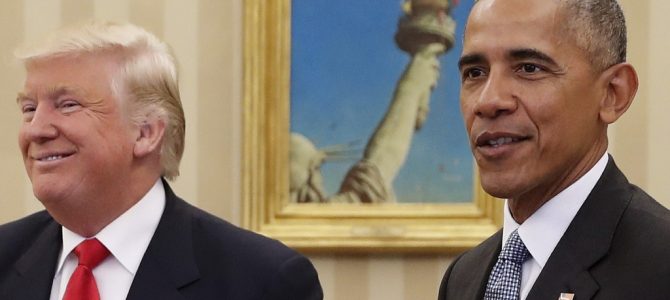
Observers on the left and the right have expressed concern at the increasing hostility of our political discourse. Most commentators want to find ways to deescalate it, but it seems that most don’t even know where to start.
But one possible solution is to look at our mutual hypocrisy as a means to understand the frustrations and concerns of our political opponents. Although Charlottesville is a tragedy that shouldn’t have occurred, the way we talk about Charlottesville provides an opportunity to foster some détente in the public sphere.
Obama Equivocated On Important Issues, Just Like Trump
The left is correct that President Trump is equivocating on Charlottesville (sadly, the name of the city has already become a metonym for white supremacy). But Trump did condemn white supremacy and neo-Nazism—just not in strong enough terms for his critics on the left. His opponents (and many in his own party) are disturbed by his assertion that “both sides” deserve the blame. Though it is still unclear exactly how the protests descended into violence, critics are correct that giving both sides equal responsibility does make it seem as though Trump is partially excusing the assortment of right-wing extremists who came out to protest the removal of the statue.
That said, this type of equivocation isn’t a new feature of the White House. For eight years, conservatives fumed over President Obama’s constant equivocation when it came to radical Islamic terrorism.
Equal distribution of blame and responsibility for the conflict between the West and the Middle East was the overarching theme of Obama’s 2009 speech in Cairo. That speech suggested that 19th century colonialism (rather than terrorism) was the primary cause of the conflict. Furthermore, Obama carefully showed how Israel and Palestine were equally to blame for their tensions and explained that Islam and the Western Enlightenment were equally responsible for the technological advances of modern life.
When it came to radical Islamic terror (foreign and domestic), Obama often insisted, for as long as possible, that we couldn’t know if the event was a terror attack (most notably in reference to Benghazi). When forced to admit that an event was, in fact, a terrorist attack undertaken by a Muslim (or Muslims), Obama and his proxies routinely claimed that there wasn’t enough evidence to determine what motivated the perpetrators to violence. Famously, even in clear-cut cases of radical Islamic terror, Obama would use the euphemism “radical extremism.” Nevertheless, when it came to cases of terror like the one that left nine African-Americans dead at a church in Charleston, Obama was (rightly) comfortable in divining the motivations and ideologies that fueled the attack.
This Isn’t About Whataboutism
The point here isn’t that “Obama did it too!” My aim is to point out a glaring inconsistency. When Obama equivocated on radical Islamic terrorism (an issue of unique concern to conservatives), those on the right were outraged while those on the left saw only a principled, pragmatic nuance that showed a keen mind.
When Trump equivocates on Charlottesville (a metonym for white supremacy, an issue of special concern to progressives), the left (and some conservatives) are outraged, while some on the right see a principled, pragmatic nuance. This mutual hypocrisy (and apparent amnesia) showcases the schizophrenia of the political moment.
So what should we do about it? There are so many issues to be discussed in relation to Charlottesville: the role of sculpture as public art, our collective relation to a shared (and contradictory) history, the value we place upon free speech, how to most effectively counter an ideology of hatred and violence, the role of the police in situations like those at Berkeley and Charlottesville.
But perhaps the most immediate work needed is reflection. In looking at our hypocritical responses, we can see our mutual responsibility for the polarity of public discourse. Progressives can now understand the feelings of anger and frustration that conservatives felt when the President obfuscated regarding the extremist Islamic ideology that resulted in dead Americans in places like Benghazi, San Bernardino, and Fort Hood, Texas.
For conservatives who are waiting for more facts on Charlottesville, or who believe that groups like Black Lives Matter and Antifa do shoulder some of the blame in this particular case, perhaps remembering their own outrage on Obama’s equivocations can evoke some empathy for those who see Trump’s comments as uniquely egregious.
Looking for our own characteristics (and especially our own flaws) in the behavior of our opponents is one way that we can begin to humanize the other side. This is urgent work. It is certain that James Fields (and no one else) was responsible for the death on the street in Charlottesville. But when it comes to our increasing inability to talk to one another, there is blame on both sides.









